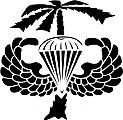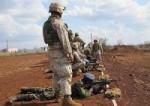While the Bush administration struggles to stabilize Baghdad, a major new threat is emerging in the Kurdish areas of northern Iraq. If it isn't defused, this crisis could further erode U.S. goals in Iraq -- drawing foreign military intervention, splintering the country further and undermining U.S. hopes for long-term military bases in Kurdistan.
The core issue is Kurdish nationalism, which worries Iraq's powerful northern neighbor, Turkey, which has a substantial Kurdish minority. The Bush administration has tried to finesse the problem, hoping to keep two friends happy: The Kurds have been America's most reliable partner in Iraq, while the Turks are a crucial ally in the region. But in recent weeks, this strategy has been breaking down.
...
The administration, realizing that it was drifting toward a confrontation over the Kurdish issue, last year appointed retired Air Force Gen. Joseph Ralston as a special emissary. His mission is to urge the Iraqis to crack down on the militant Kurdish political party known as the PKK, which uses Iraqi Kurdistan as a staging point. The Turks denounce the PKK as a terrorist group and threaten that if the United States doesn't take decisive action to suppress it, the Turkish army will.
Ralston is said to have warned top administration officials in December that the Turks might invade by the end of April unless the United States contained the PKK. Other knowledgeable officials are similarly worried, and one analyst has predicted that the Turks may seize a border strip about eight miles deep into Iraq. Ralston has tried his best to defuse the crisis, clearing a Kurdish refugee camp of suspected PKK members and talking regularly with both sides. But the time bomb continues to tick.
...
Turks and Kurds have fired heavy rhetorical barrages the past few weeks. Kurdish leader Massoud Barzani warned that if the Turks meddled in Kirkuk, "then we will take action for the 30 million Kurds in Turkey." The head of the Turkish general staff, Gen. Yasar Buyukanit, responded that "from an exclusively military point of view," he favored an invasion of Iraq to clean out PKK havens. If the Turks do attack, counters one Kurdish official, "their own border will not be respected. They will not be the only ones to choose the battlefield."
A wild card in the Kurdish problem is Iran. Like the Turks, the Iranians have a restless Kurdish minority and would be tempted to intervene militarily against a militant group called PJAK that operates from Iraqi Kurdistan. Indeed, top Iranian military officers met in Ankara recently for discussions with the Turkish general staff about possible military contingencies in Iraq, according to one U.S. official.
...
Adding to this toxic brew is growing tension between the United States and Kurdish leaders. The Kurds were furious when they weren't given prior notice about a U.S. Special Forces raid in January that attempted to snatch two top Iranian Revolutionary Guard officers at the Irbil airport in Kurdistan. Unwitting Kurdish pesh merga troops at the airport nearly opened fire on the Americans. Although the airport raid was a failure, U.S. forces did manage to grab five Revolutionary Guard members at an Iranian consular office, which embarrassed the Kurdish leadership. The Kurds feel their friendship for America has been taken for granted ...












Bookmarks